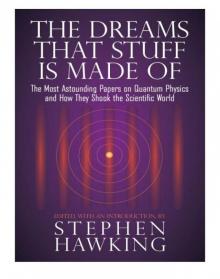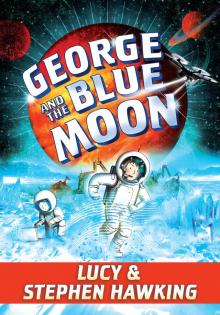- Home
- Stephen Hawking
George and the Blue Moon Page 2
George and the Blue Moon Read online
Page 2
“Well, don’t,” said Annie firmly. “I bet Nana and Grandad didn’t say to you: ‘Don’t be a cosmologist, little Eric, because you’ll never get a job that way.’ ”
“Actually they did,” said Eric mildly. “But I didn’t pay attention.”
“Well, now you know how that feels,” said Annie firmly. George was very pleased to see how much more cheerful she looked.
“I don’t think I ever spoke to my parents the way you speak to me,” complained Eric.
“Perhaps they inspired respect?” asked Annie innocently.
Eric gave her a mock frown, but George knew he wasn’t angry with Annie. It was just how they were, bickering endlessly about everything but in a funny and friendly way. Mostly.
Standing right next to Cosmos and Annie’s tablet, George was the first to see an outgoing message on the tablet screen, sent by Cosmos via the tablet to the same number that had been harassing Annie. But there wasn’t just one message; there was a first one, which was followed instantly by another and another and another.
“Cosmos, what are you doing?” asked George in wonder.
“I,” the supercomputer replied happily, “am sending over, in one-hundred-and-sixty-character chunks, the full text of Principia Mathematica, the great work of Isaac Newton. Once that has been sent, I will continue with Charles Darwin’s On the Origin of Species, which will be superseded by the collected works of Einstein. It should take around one hundred and fifteen hours for all the text to go through. I do not think you will hear from this correspondent again, not given the amount of interesting reading matter we have supplied.”
“Genius!” cried Eric. “You have invoked the ‘Respond by Education, Not Threat’ clause of the agreement!”
“To the very letter,” said Cosmos. “Would you like me to show you from whence your messages originated?”
“Yes!” said Annie. “You know who sent them then? Oh, Cosmos, lovely Cosmos, I wish I’d asked you to find out stuff about this for me before.”
Cosmos didn’t answer, but simply posted a map on his screen with a big red arrow pointing to a nearby address. “Is this location known to you?” he asked.
Annie had turned a sickly whitish-green again. “That’s Belinda’s house! I thought she was my friend,” she whispered, sounding brokenhearted. “I thought she wasn’t joining in with the others. She said they were awful and should know better.”
Her dad put his arm round her. “I’m sorry, darling,” he said. “We think we know people, but …” His face brightened up. “Cosmos! Can you continue performing this action and open the portal at the same time?”
Cosmos snorted. “Of course, Professor,” he said. “This task uses around 0.000000000001 percent of my full capacity.”
“Good!” said Eric. “Under the ‘Entertainment and Welfare’ section of the agreement in relation to scientists suffering from distress, I have a request!”
He winked at the two friends. They knew he was treating them like real grown-ups, like proper members of the Order of Science in order to cheer them up—and it was working! They both loved pretending that they were adult scientists with important experiments and ideas that might change the future of the world. Annie and George looked at each other, not daring to hope.
“Dr. Bellis, I presume,” murmured George.
“Professor Greenby,” replied Annie politely. “Such an honor to know your work.”
“Put your space suits on,” said Eric firmly. “Cosmos, open the portal. I will give you the coordinates. Because, fellow scientists of the Order of Science, we are going on a field trip.”
The Oceans of Earth by Professor Ros E. M. Rickaby
Earth—our blue planet—is exceptional in our solar system as it is nearly three-quarters covered by the oceans. But why are our oceans here? Intriguingly, Earth’s oceans arrived from outer space. When the Earth was forming, it was too hot for water to condense on the planet. Just as tall mountains have snowy white tops above the “snow-line,” where the cooling of the atmosphere with height allows snow to persist, so too was there a gradient of cooling to a snow-line away from the ferociously hot early Sun.
Temperatures cold enough for ice grains to form were only reached farther out in the solar system, in the asteroid belt somewhere between Mars and Jupiter. Earth’s oceans, therefore, had to be imported: many think this happened with a shower of water-rich meteorites or comets from the asteroid belt bombarding the early Earth.
Since then these extraterrestrial water molecules have been neither created nor destroyed! For the subsequent 3.8 billion years (the first evidence for liquid water comes from sediments of this age on southwest Greenland), our oceans have been trapped on the Earth’s surface, where they go around in two cycles.
First, the warmth of the Sun in the tropics turns some of the ocean to vapor (just as you see coming from a boiling kettle or steam engine) and clouds. Rising clouds cool and create rain, which trickles across the land and into streams and rivers before gushing back into the oceans.
Second, small amounts of water pop down into Earth’s interior, through deep-sea trenches in the ocean crust. This water rapidly returns to the surface through volcanoes or hydrothermal vents.
So the very same water molecules coming out of your taps at home have witnessed every second of Earth’s history, from before the start of self-reproducing life itself to the emergence of multi-celled organisms. Most probably, these water molecules passed through a dinosaur at some point. You could be making a cup of tea out of water that was once slurped down by a thirsty T. rex!
What makes water so extraordinary and the oceans so key to life is its ability to dissolve things. Put some salt in a glass of water, or sugar in your tea, and those crystals will disappear or dissolve. This is because of the slight charge or “polarity” of water molecules, which attracts elements into solution.
Water is even better at dissolving things if it is made a little acidic, by reacting with something like carbon dioxide to make carbonic acid. Take a sip of sparkling water (those bubbles are carbon dioxide) and see if you can taste the acidity; both my sons wrinkle their noses on doing so. Now, when water cycles from the oceans to clouds, then to rain and down rivers, it becomes a bit acidic by reacting with carbon dioxide in our atmosphere. As a result, this carbonated rainwater dissolves elements out of the land (this is called weathering), takes them into the rivers, and the elements end up going into the oceans. Have you ever seen reddish-brown rivers? These are full of iron that has been leached out of the rocks.
The oceans accumulate all the elements dissolved from the land (and from reaction with the deep ocean floor at hydrothermal vents, such as spectacular black smokers). But only the water molecules themselves keep on cycling back to clouds—the elements are left behind. Some elements get so concentrated in the ocean that they turn back into minerals and fall out as sediments, notably limestone (calcium carbonate) and cherts (silica), a process which limits their concentration in the sea.
Unlike most elements, however, the elements sodium or chlorine—the two ingredients of salt—only fall out from the ocean episodically and in exceptional circumstances. For example, the entire Mediterranean dried up to a puddle about 6 million years ago, leaving huge salt deposits. The lack of a natural continuous “sink” for sodium and chlorine means that the sea is always salty.
The weathering of land by water is the very reason why life could appear and remain on Earth: It acts as a thermostat for Earth’s temperature. The speed of weathering depends on Earth’s temperature. So if, for any reason, the temperature rises—due to the increase in solar luminosity over Earth’s history, for example—or if there is an increase of carbon dioxide (a greenhouse gas that warms the Earth) in the planet’s atmosphere, then the rocks on land dissolve more quickly. This leads to a rush of elements (and carbon) into the oceans—which in turn speeds up the formation of sediment. This locks additional carbon dioxide into limestones, thus resetting the planet to its previous conditi
ons and stopping everything from overheating. How do you think weathering works to stop the Earth completely freezing over?
While weathering maintained temperatures favorable for life to appear, we do not know, and perhaps might never know, where life did begin on our Earth (now there’s a challenge for you!). Was it in some “warm little pond,” as the great naturalist Darwin suggested, or at the depths of the ocean? Whichever it was, one thing we do know is that life’s origins and evolution depended on water. Elements are bound rigidly in rocks in the Earth’s crust, but the ocean is a watery cocktail of all those rocky elements (and organic molecules) highly available, all free to diffuse and react. This is the key to initiating life.
It is believed that the deeper oceans likely provided a safe haven for life’s very first stirrings—the surface of the early Earth would have been a much harsher environment. Down in the oceans, harmful radiation was filtered out, and the seas provided buffering against extreme temperatures and protected the development of life against bombardments of meteorites and intense volcanic outpourings.
From uncertain origins perhaps 2.7 billion years ago, scientists believe that the first 2 billion years of life’s history almost certainly then played out in the ocean. But an inescapable feedback spurred life to become more and more complex. The increasing success of microbes created more chemical byproducts (notably oxygen in the atmosphere), most of which were initially toxic. So to afford more and better control of internal chemistry, simple cells became compartmentalized (these kinds of cells are called eukaryotes) and ultimately differentiated.
This appearance of multi-cellularity coincided with the most spectacular of life’s inventions—that of the skeleton. During this “Cambrian explosion,” 0.54 billion years ago, the rock record of life shows a change from faint ambiguous imprints to a diversity of robust yet intricate shell fossils, undoubtedly sculpted by organisms of complexity (indeed Darwin misread this explosion as the dawn of life).
The solution of Earth’s minerals concentrated in the ocean—as explained before—made making hard parts like shells relatively easy. Just as the horned dinosaurs developed ever more elaborate ornamentation against the increasing ferocity of the Tyrannosaurs, these first “biominerals” afforded armored protection against forces, poisons, and, importantly, predators.
Skeletons—shells and bones—gave rigidity to support animal life in the first steps onto land!
Over Earth’s history, the weathering thermostat has maintained a balance between the amount of acidity (the carbon dioxide) and the amount of alkalinity (the dissolved ions in the ocean). You might think of the continents as an indigestion remedy or “antacid” for the ocean. As long as the oceans have been present, they have always been slightly alkaline—perfect for making skeletons.
But we—and future generations on Earth—face a growing problem.
The booming of mankind and our thirst for fossil fuels is adding carbon dioxide—hence acidity—to the ocean at an unprecedented rate. In a million years or so, the dissolution of the land masses of our continents will accelerate sufficiently to start to neutralize this great burp of carbon dioxide into our waters. But this weathering is inherently slow, so in the meantime, the oceans are becoming a bit less alkaline and a bit less saturated. This process is often termed ocean acidification. “Ocean slightly less alkalization” would be a more accurate description, though less headline-grabbing!
Vulnerable organisms such as coral reefs will find skeleton generation increasingly challenging. This could have enormous ramifications across the marine ecosystem. Unless organisms can adapt—and fast!
Some scientists believe we should intervene to redress global warming and acidification by “geoengineering” carbon dioxide removal. This could include manipulating the weathering of the land, to release more alkaline elements into the seas.
But should we really embark on yet another global-scale experiment with our Earth?
What do you think?
Chapter Two
“A field trip!” Annie was overjoyed. “You haven’t let us use the space portal in, like, forever!”
The portal, Cosmos’s computer-generated doorway to space, had been closed to George and Annie for some time now. When Annie was a little girl, her father used to take her for spacewalks quite often, in the way other dads would take their kids to the park. But since the new regulations about supercomputers, Eric had been very firm that Cosmos was a tool for professional research only and not for exciting activities on rainy Earth days.
Annie and George hadn’t really been listening to the whole long and rather boring rigmarole that Eric had poured out one day, in one of his endless complaints about the nowhated Rika Dur, his second-in-command, and how she insisted on writing a special new rule for everything that used to just happen by itself in the past. But they had certainly listened when Eric told them that the upshot of all of this was no more journeys into space for Annie and George using supercomputer Cosmos and his amazing portal.
And yet now, to their delight, it looked as though Eric himself was fed up with the rules and regulations and wanted to go out to space too in order to make Annie feel better after her horrible experience on Earth.
But Cosmos didn’t seem so sure this was a good idea. A computer, even a supercomputer, can’t actually look down its nose, but that was exactly what Cosmos seemed to be doing.
“Professor,” he said. “I have a compliance issue with your request.”
George’s heart sank. It felt as though they were so close to getting out into space and now Cosmos was putting the brakes on! It was unbearable! George could almost taste space in his mouth he was so excited about the prospect of exploring with Annie and Eric beside him. He just couldn’t wait for that extraordinary feeling when he stepped over the threshold of Cosmos’s doorway and once again was free-floating above some incredible cosmic planetscape. And now, after all, it might not happen. His shoulders drooped.
But Eric, who was halfway into his space suit, which he put on over his normal clothes, simply asked, “Why?”
“It does not meet the criteria under the provisions of the agreement. I find no specific mention of field trips into space merely in order to cheer people up.”
“It’s not ‘people,’ ” protested Annie. “It’s me and George.”
“Regretfully,” said Cosmos, “that makes it even worse.”
Eric paused. He was clearly trying to think of a way to get around the problem. The two friends watched him, willing him to find a really clever solution that would let them get out into space, even if just for a minute or two. But as Eric sighed and started to slip off his space suit again, they realized it wasn’t going to happen.
“Cosmos is right,” he said sadly. “We’ll all be in huge trouble if anyone finds out I used a supercomputer to take kids—”
Annie interrupted. “Not kids—two members of the Order of Science! We became members of the Order of Science years ago—you got us to join so we could help you understand what kids want to know about science to make the future world a better place.”
“—into space,” Eric finished.
“Trouble with who?” asked George longingly. “We won’t get into trouble with anyone, will we? I don’t see how that could happen.” But he didn’t sound very convincing. Memories of space trips he had taken that hadn’t worked out very well—and got them into lots of trouble with all sorts of people—surfaced in his mind.
Eric frowned. “Some of the Order wouldn’t mind,” he said. “But if Rika”—he almost spat the name out—“found out, she’d rocket me into space from Kosmodrome 2 on a one-way ticket.”
Kosmodrome 2 was the name of Eric’s new-ish place of work. Recently, he’d taken over as head of Kosmodrome 2—an international space facility and joint enterprise involving lots of countries and private companies, trying to bring the plans for robotic and manned space travel together into one gigantic whole. Annie and George had pestered Eric to take them to his “office”
but Eric had regretfully refused. Kosmodrome 2 was a closed facility, he explained. Only in exceptional circumstances could they have visitors. However many exceptional circumstances Annie and George dreamed up, none of them seemed to make the grade.
“To think I was so pleased when I got that job,” said Eric, folding his space suit up surprisingly neatly and putting it back in the cupboard. “I really thought I could help coordinate the world’s efforts to get farther into space. Turns out, I can’t even manage the person who is supposed to be helping me.”
Annie looked at her dad sympathetically. “Are you being bullied too?” she asked.
“You could say that,” admitted Eric. “I’m being bullied at work. Except it’s all so clever and so sneaky that I sometimes I wonder if I’m going mad and imagining things. Everything I do at work goes wrong somehow, and yet I don’t understand why, except that it all started when Rika came back from her vacation. She was normal, friendly, helpful, nice before—and then after she wasn’t… . It’s so very, very odd.”
“Are they whispering about you as well?” asked Annie solemnly.
“Yes!” said Eric, as though this was a revelation to him. “They are! Whenever I pass people in the corridors—and Jupiter knows, we have enough corridors at Kosmodrome 2—they seem to be whispering, but they stop while I walk past and then start again!”
“Horrid,” said Annie. “Do they make up stories about you as well?”
“Goodness, yes,” said Eric fervently. “Completely bonkers ones too! Why would I deliberately trigger the space elevator to malfunction when we have a group of important international guests? I just wouldn’t do that!”
George was startled. He hadn’t heard anything about an incident with a space elevator—he was pretty sure he’d remember if he had; it wasn’t the sort of thing he would forget in a hurry. In fact, he hadn’t heard anything about a space elevator at all! This was really important and exciting stuff that they were missing out on!

 The Grand Design
The Grand Design A Brief History of Time
A Brief History of Time The Dreams That Stuff is Made of
The Dreams That Stuff is Made of My Brief History
My Brief History A Briefer History of Time
A Briefer History of Time A Stubbornly Persistent Illusion
A Stubbornly Persistent Illusion George and the Blue Moon
George and the Blue Moon George and the Unbreakable Code
George and the Unbreakable Code Brief Answers to the Big Questions
Brief Answers to the Big Questions George's Secret Key to the Universe
George's Secret Key to the Universe